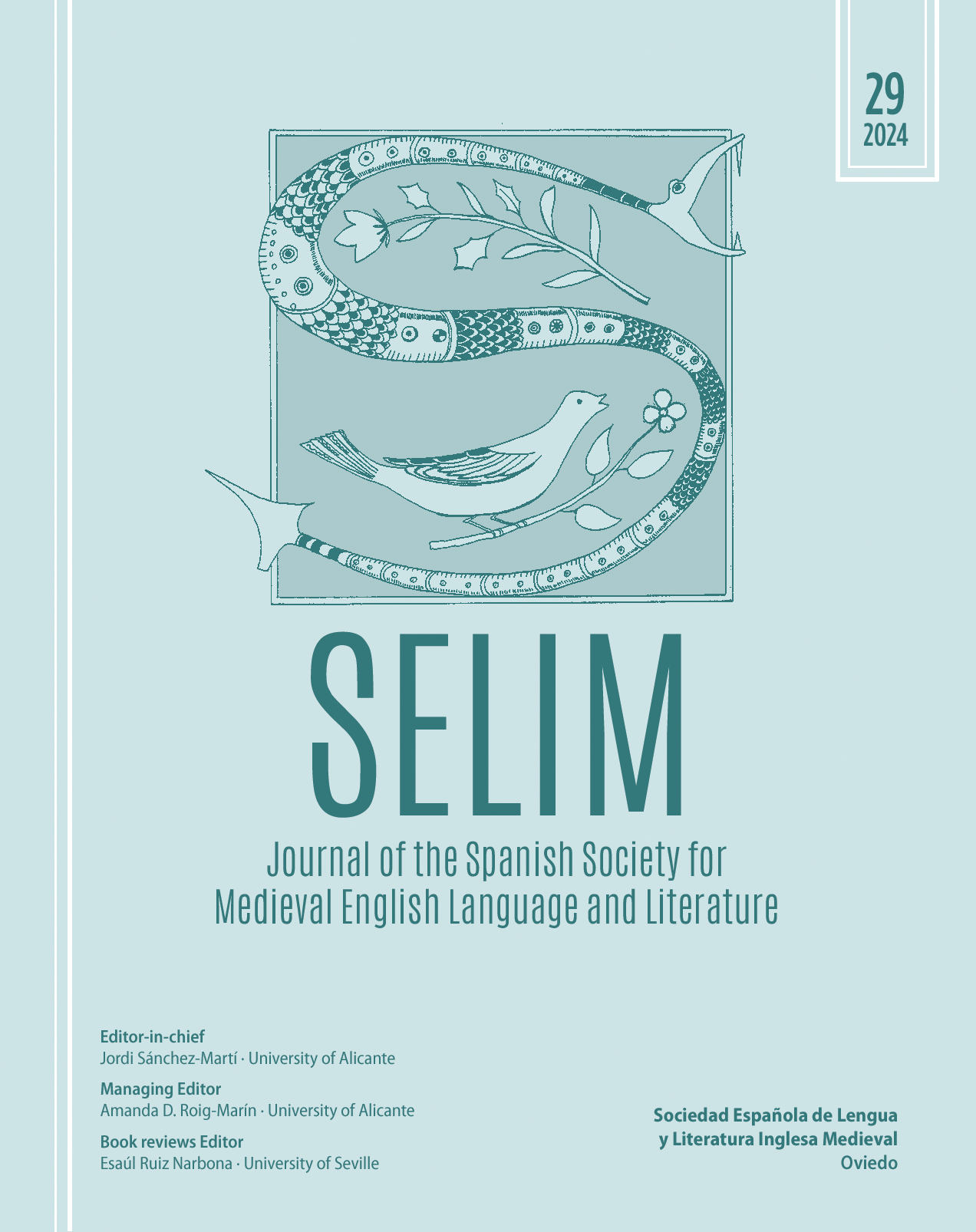Abstract
This article will argue that the author of the Old English Metres of Boethius enhanced the mystical themes of the B text (the prose text) in the light of ideas articulated in John Scottus Eriugena’s Periphyseon, permeated by the Greek thought of Gregory of Nyssa, pseudo-Dionysius and Maximus the Confessor. In particular, it presents a mystical reading of the unique poetic compound runcofa, “the mystery chamber,” which appears in Metre 22 paired with incofa, “an inner chamber,” proposing that these terms bear the mark of what Eriugena terms adyta, “the inner sanctuary,” the dwelling place of “obscurissimas tenebras excellentissimae lucis,” “the uttermost darkness of the most excellent Light” (Eriugena, Periphyseon V, 983B). Interpreting Metre 22 as a theophany, the article focuses on Mod’s descent into the innermost heart— runcofa—the place of mystical union.References
Primary Sources
Bosworth-Toller = Bosworth, Joseph. 2014. Bosworth Toller’s Anglo-Saxon Dictionary Online. Edited by Thomas Northcote Toller, Christ Sean, and Ondřej Tichy. Prague: Charles University. https://bosworthtoller.com. Based on Bosworth, Joseph, and Thomas Northcote Toller, ed. 1898. An Anglo-Saxon Dictionary, Based on the Manuscript Collections of the Late Joseph Bosworth. Oxford: Clarendon Press; Northcote Toller, Thomas. 1921. An Anglo-Saxon Dictionary. Supplement. Oxford: Clarendon Press.
Douay-Rheims = Mann, Paul, ed. 2001. Douay-Rheims Bible Online, Official Catholic Version, with Revisions and Footnotes by Bishop Richard Challoner. https://www.drbo.org.
Godden, Malcolm, and Susan Irvine, eds. 2009. The Old English Boethius. 2 vols. Oxford: Oxford University Press.
Green, Richard H., trans. 2002. The Consolation of Philosophy by Boethius. Mineola, NY: Dover Publications.
Hurst, Dom David, ed. 1983. Bedae: In Epistolas VII Catholicas. Corpus Christianorum Series Latina 21. Turnhout: Brepols.
Hurst, Dom David, trans. 1985. The Commentary on the Seven Catholic Epistles of Bede the Venerable. Cistercian Studies Series 82. Kalamazoo: Cistercian Publications.
Jaeger, Werner, and Hermann Langerheck, eds. and trans. (1960) 1987. The Commentary on the Song of Songs by Gregory of Nyssa: Scriptural Verses, Notations and His Text. Brookline, MA: Hellenic College Press. Originally published as Gregorii Nysseni Opera: In Canticum canticorum. Vol. 6. Brill: Leiden.
Jeauneau, Édouard, ed. 2003. Iohannis Scotti seu Erivgenae: Periphyseon. Liber Qvintvs. Turnhout: Brepols.
Lockett, Leslie, ed. and trans. 2022. Augustine’s “Soliloquies” in Old English and in Latin. Dumbarton Oaks Medieval Library 76. Cambridge, MA: Harvard University Press.
Luibheid, Colm, trans., and Paul Rorem, ed. and trans. 1987. “The Divine Names.” In Pseudo-Dionysius: The Complete Works. The Classics of Western Spirituality, 47–132. New York: Paulist Press.
Orchard, Andy, ed. 2022. Word-Hord: A Lexicon of Old English Verse, with a Particular Focus on the Distribution of Nominal and Adjectival Compounds. Oxford: CLASP Ancillary Publications. https://clasp.ell.ox.ac.uk/wordhord-v2.pdf.
Sheldon-Williams, I.P., and John O’Meara, trans. 1987. Eriugena: Periphyseon. Cahiers d’Études Médiévales: Cahier Spécial 3. Montreal: Bellarmin.
Weinberger, Guilelmus, ed. 1934. Boethii, Anicii Manlii Severini. Scriptorum partem IV: Philosophiae consolationis. Libros quinque. Corpus Scriptorum Ecclesiasticorum Latinorum 67. Leipzig: Akademische Verlags-Gesselschaft.
Secondary Sources
Carabine, Dierdre. 2000. John Scottus Eriugena. Oxford: Oxford University Press.
Faulkner, Amy. 2019. “Seeking within the self in The Metres of Boethius.” Anglo-Saxon England 48: 43–62.
Godden, Malcolm R. 2008. “Anglo-Saxons on the Mind.” In Learning and Literature in Anglo-Saxon England: Studies Presented to Peter Clemoes, edited by Michael Lapidge and Helmut Gneuss, 271–98. Cambridge: Cambridge University Press.
Jeauneau, Edouard. 1983. “Pseudo-Dionysius, Gregory of Nyssa, and Maximus the Confessor in the Works of John Scottus Eriugena.” In Carolingian Essays, edited by Uta-Renate Blumenthal, 137–49. Washington, DC: Catholic University of America Press.
Jones, Jasmine. 2021. “The Lady and the Letter: Two Ecclesiastical Analogies in the Old English Soliloquies.” SELIM 26: 1–23.
Lenz, Karmen. 2011. “The Star-Like Soul in the Metra of the Old English Boethius.” Anglo-Saxon England 39: 139–62.
Louth, Andrew. 2007. The Origins of Christian Mystical Tradition: From Plato to Denys. Oxford: Oxford University Press.
Mainoldi, Ernesto Sergio. 2020. “The Reception of the Greek Patristic Doctrine of Deification in the Medieval West: The Case of John Scottus Eriugena.” In Mystical Doctrines of Deification: Case Studies in the Christian Tradition, edited by John Arblaster and Rob Faesen, 60–71. London: Routledge.
Mize, Britt. 2008. “Manipulations of the Mind-as-Container Motif in Beowulf, Homiletic Fragment II, and Alfred’s Metrical Epilogue to the Pastoral Care.” Journal of English and Germanic Philology 107: 25–56.
Moran, Dermot. 1990. The Philosophy of John Scottus Eriugena: A Study of Idealism in the Middle Ages. Cambridge: Cambridge University Press.
Otten, Kurt. 1964. König Alfreds Boethius. Tübingen: Max Niemeyer.
Ponirakis, Eleni. 2021. “Echoes of Eriugena in the Old English Boethius.” Neophilologus 105: 279–88.
Ritzke-Rutherford, Jean. 1980. “Anglo-Saxon Antecedents of Middle English Mystics.” In The Medieval Mystical Tradition in England: The Exeter Symposium, edited by Marion Glasscoe, 216–33. Exeter: University of Exeter Press.
Treschow, Michael. 1993. “Echoes of the Periphyseon in the Third Book of Alfred’s Soliloquies.” Notes and Queries 40: 281–86.

This work is licensed under a Creative Commons Attribution-NonCommercial-NoDerivatives 4.0 International License.
Copyright (c) 2024 SELIM. Journal of the Spanish Society for Medieval English Language and Literature.




